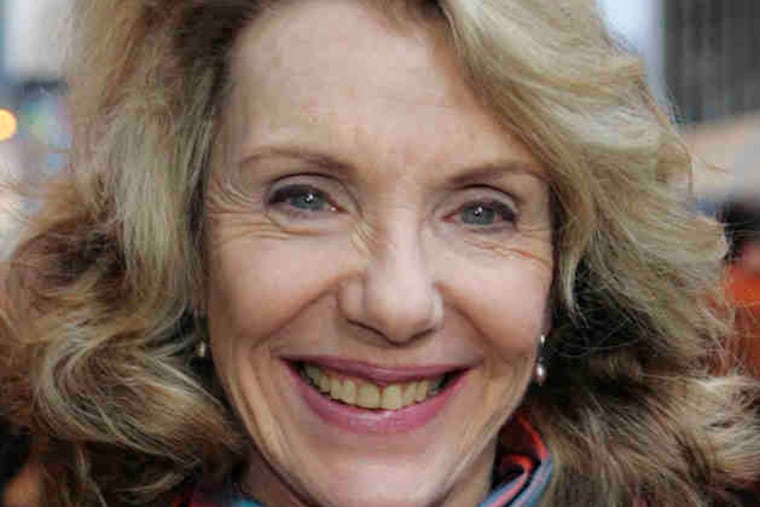Versatile actress Jill Clayburgh
She portrayed women in their new social roles, showing the Hollywood face of their liberation.

In early 1981, when the appointment of Sandra Day O'Connor, the first female Supreme Court justice, was still a gleam in President Reagan's eye, Jill Clayburgh was on a soundstage playing Ruth Loomis, the first female Supreme in Ronald Neame's
First Monday in October
. Brainy, mouthy, near-beautiful, Ms. Clayburgh was the go-to actress to boldly go where no woman had gone before.
Ms. Clayburgh, who died Friday at her Connecticut home at 66 after living two decades with leukemia, was the Hollywood face of what was quaintly known as Women's Lib. For five years, between 1977 and 1982, the Oscar-nominated star of An Unmarried Woman and Starting Over personified a new breed of American female, defined by professional rather than marital status.
Here was a woman who spoke her mind and owned her sexuality among the most macho of men, as she did in Semi-Tough (1977), going on the offensive against gridiron gods Burt Reynolds and Kris Kristofferson. She was outspoken both on and off screen. At the height of her career, coming off best-actress honors at Cannes for An Unmarried Woman, Ms. Clayburgh shrugged off her celebrity, telling People magazine she "worried that women in movies were going to be a fad - like sharks."
Her long-stemmed patrician looks, earthy sexuality, and husky voice made for a potent mix.
She was simultaneously vulnerable and volatile, equally adept at heavy and light. She juggled dramas like I'm Dancing as Fast as I Can and Hustling with comedies like Silver Streak and It's My Turn. She distinguished herself on stage, in the musicals Pippin and The Rothschilds, on television as the jaded prostitute in Hustling, and especially in film, where her roles ranged from the mathematician negotiating love triangles in Claudia Weill's It's My Turn to the incestuous opera singer in Bernardo Bertolucci's Luna. In recent years, she had recurring roles on television's Ally McBeal and Nip/Tuck.
Ms. Clayburgh was the daughter of a successful Manhattan businessman and his theater-insider wife, assistant to Broadway producer David Merrick. The future actress remembered herself as an oppositional child, entering four-times-weekly psychotherapy when she was 8.
She later characterized psychoanalysis "as a growth opportunity - like going to graduate school or to Europe."
As an undergraduate at Sarah Lawrence College, she fell into acting, making her movie debut opposite Robert De Niro in Brian De Palma's The Wedding Party (made in 1963, released in 1969). Between 1966 and 1971, she worked at Boston's Charles Playhouse, often opposite live-in lover Al Pacino. Her trust fund paid the rent.
She worked in daytime drama, Off-Broadway and on. While appearing as Catherine in Pippin, she met her future husband, David Rabe, in 1973 when she auditioned for - and failed to win - the lead role in the playwright's The Boom Boom Room. (Madeline Kahn got the part as the bisexual Philadelphia go-go dancer). Though Ms. Clayburgh lost that role, she was cast as the flinty Manhattan call girl in the teledrama Hustling (1974), which earned her widespread notice.
With her appearance as the knockabout traveling companion of Gene Wilder and Richard Pryor in the blockbuster Silver Streak (1976), at 32 Ms. Clayburgh became Hollywood's It Gal. Her defining roles as the sexually candid heiress in Semi-Tough, the unmoored wife in An Unmarried Woman, and the mousy schoolteacher in Starting Over demonstrated her Everywoman versatility.
One role she did not perform gracefully was that of celebrity.
In 1978, after collecting actress honors at Cannes, she wed Rabe and became stepmother to his son, Jason. She got married, she told People magazine, "so people would stop asking about my personal life." She and Rabe had two children, Michael and Lily - an actress scheduled to costar as Portia to Pacino's Shylock on Broadway in The Merchant of Venice.
She took a furlough from Hollywood to raise her children in Connecticut. When she returned to active duty on stage and screen in the late 1980s, Ms. Clayburgh was diagnosed with leukemia. She continued to work and will soon be seen in Ed Zwick's film Love and Other Drugs.
Ms. Clayburgh was best described by Reynolds, her costar in Semi-Tough and Starting Over, as "innocence masked by chutzpah."
She is survived by her husband; children; her brother, James; and a generation of fans who found inspiration in her intelligence and sensuality.